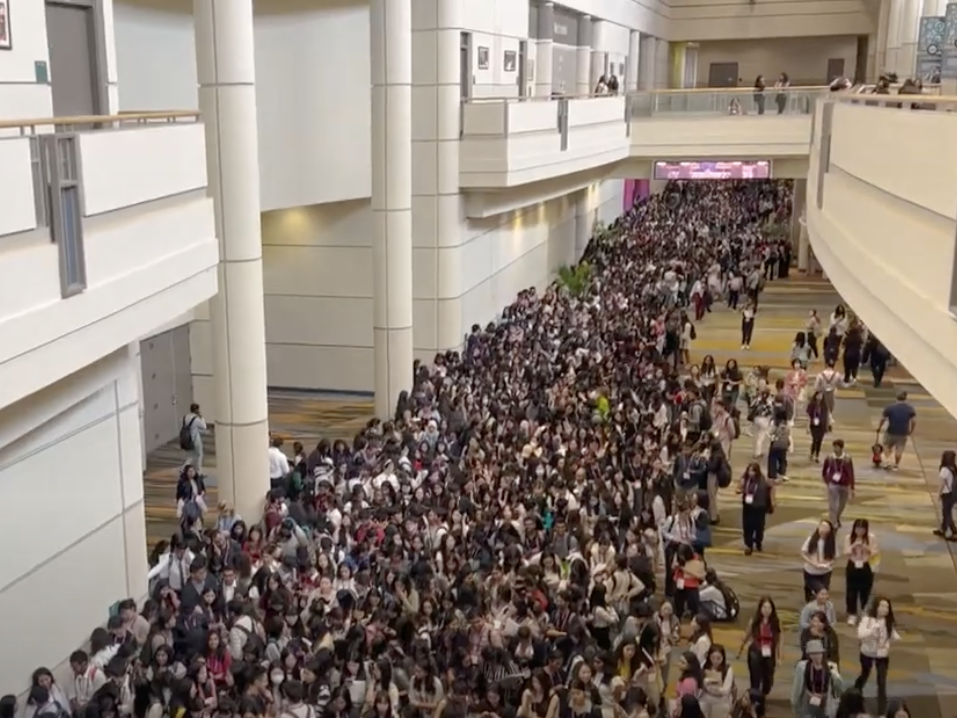@jennywnuo and im not talking about non-binary indivudals too. im taking about the self identifying men with he/him pronouns on their nametags — shamelessly attending #ghc solely for the career fair and taking opportunities from women. #gracehopperconference ♬ original sound - jenny nuo
Section Branding
Header Content
'You could feel the cutthroatness': Droves of men took over this women's tech fair
Primary Content
Updated October 6, 2023 at 1:10 PM ET
An event meant to be a career-builder for women and nonbinary tech workers turned into yet another symbol of the industry's gender imbalance after self-identifying men showed up in droves.
The Grace Hopper Celebration takes the name of a pioneering computer scientist and bills itself the world's largest annual gathering of women and nonbinary tech workers.
Tickets for the four-day event, which took place in Orlando, Fla., last week, ranged in price from $649 to $1,298, and included a coveted chance to meet one-on-one with sponsors such as Apple, Amazon, Salesforce and Google.
With some 30,000 annual attendees, that career expo was already a competitive space, according to past participants. But this year, access was even more limited by what the organizers described as "an increase in participation of self-identifying males."
Videos posted to social media showed scenes of men flocking around recruiters, running into event venues and cutting in front of women to get an interview slot. Footage showed a sea of people, hundreds deep, waiting in line for a chance to enter the career expo.
As one poster put it, "the Kens had taken over Barbieland."
Several conference-goers told NPR there was a 40/60 ratio of men to women, especially at the career expo.
"From what I'd heard, I was expecting maybe half a percent to 1% of the attendees would male," said Morgan Young, a computer science student at the University of Nevada, Reno who also creates content for early-career tech workers on social media.
"I heard it was like the Coachella of tech for women. It's supposed to be fun and collaborative," she told NPR in an interview this week. "But the vibe was so different. You could feel the cutthroatness in the air."
Some of the attendees had lied about their gender identity on their conference registrations, said Cullen White, the chief impact officer with AnitaB.org, the nonprofit that organizes the conference.
"Judging by the stacks and stacks of resumes you're passing out, you did so because you thought you could come here and take up space to try and get jobs," White said during the conference's plenary address. "So let me be perfectly clear: Stop. Right now. Stop."
Bo Young Lee, AnitaB.org's president, said in a video post that the shift in demographics had robbed the conference of the joyous and supportive atmosphere that had previously helped women grow.
"We tried to create a safe space. And this week, we saw the outside world creep in," she said. "I can't guarantee you that we'll have solutions tomorrow. But I can promise you that we'll be working on solutions, and we won't do it in a bubble."
Earlier in the week, the organization addressed calls to ban men from the conference by saying that "male allyship is necessary" to work toward overall inclusivity and also that federal law prohibited discrimination based on gender.
NPR reached out to AnitaB.org for additional comment but had not received a response by the time this article was published.
Some of the attendees said they felt like the organizers had prioritized profit over people, registering more attendees than they had the capacity to handle, then subjecting women and nonbinary workers to a familiar feeling of needing to compete with men.
"You're basically paying hundreds to do the same thing that you're experiencing in the industry, trying desperately to get your resume everywhere," said Agnes Lu, a master's student in computer science at Northeastern University. "It feels like we were tricked."
Tech jobs were once a safe bet for workers looking for stable, lucrative careers. But an industrywide wave of layoffs earlier this year left hundreds of thousands of workers suddenly without a job.
Women were disproportionately affected by those cuts, making up 69.2% of all tech layoffs, according to The Women Tech Network. And that's on top of the industry's ongoing gender imbalance. Women hold just 26% of jobs across all STEM occupations and even less — 24% — in computer fields, according to the latest available data from the U.S. Department of Labor.
The pressure is even higher for the industry's international workers, who are at risk of losing their visa if they fail to find employment quickly.
"We're set with a timer of like 90 days," said Anusha Das, an international graduate student studying information systems at Northeastern. "There's competition. The job market is bad. There's no grace for us, really."
Das said she missed most of the other workshops and panels at the conference just to stand in hour-long lines to secure a two-minute interview with recruiters.
In one of those lines, she said she heard a group of men casually using misogynistic slurs in her native language, Hindi. In another, she watched a group of men splinter off to make a new line, effectively cutting the other people who'd been waiting patiently.
But she said she also didn't regret these long waits — in fact, they made for some of the best experiences of the conference.
"I would talk to other girls while I was waiting in line and they were hyping me up, telling me not to be nervous," she said. "The best things about the conference were the stuff that's not actually advertised."
Copyright 2023 NPR. To see more, visit https://www.npr.org.

